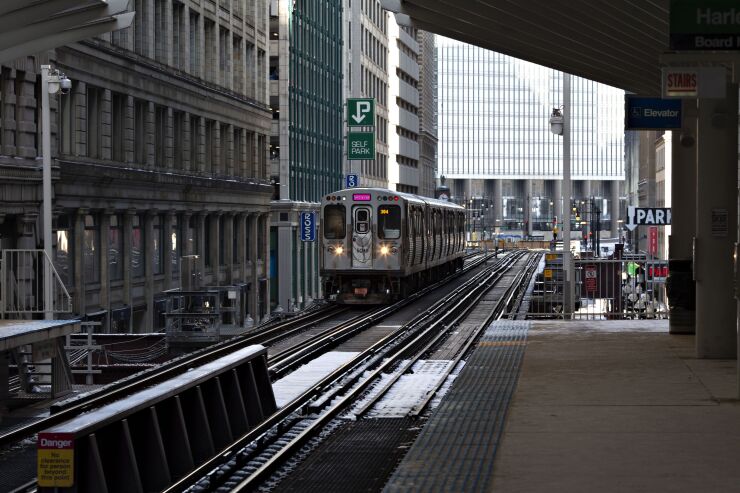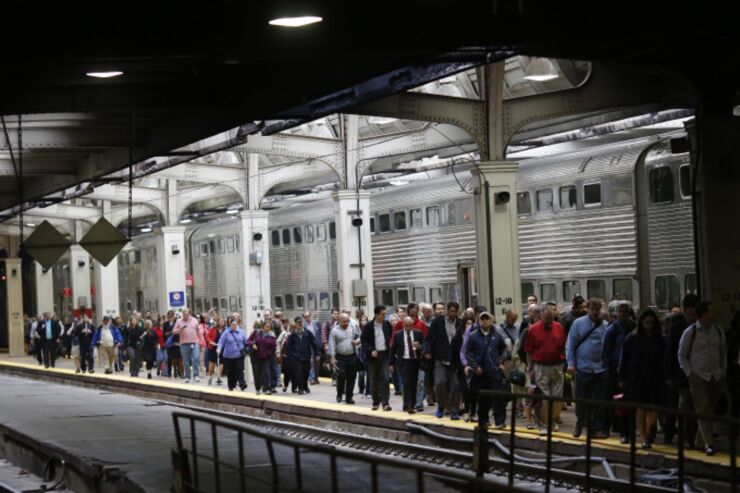The Regional Transportation Authority of Illinois heads into 2020 with a long-sought upgrade after getting a state boost in capital funding and with a steady flow of state operating support expected.
Fitch moved the RTA’s rating to AA-plus from AA on $1.7 billion of outstanding general obligation bonds and cash flow notes. The outlook on the bonds, which are secured by a first lien on authority sales taxes and public transportation funds from the state, remains stable.

“Improved cash flow from reduced state payment delays combined with solid pledged revenue growth prospects and exceptional financial resilience throughout a downturn scenario” drove the upgrade, Fitch said on Dec. 16.
Passage of a $45 billion, six-year statewide infrastructure budget that ended the RTA’s capital drought helps, but operating aid risks remain.
“While recently announced state capital funding is a positive for the authority, the state remains vulnerable to continued fiscal stress, which could result in future operating revenue reductions to the authority,” Fitch warned. “These are unlikely to reach the point of materially diminishing resilience; nevertheless, severe revenue reductions beyond Fitch's expectations could weaken credit quality.”
The state had previously trimmed public transportation funds by 5% but the RTA’s service boards — the Chicago Transit Authority, Metra commuter rail, and Pace suburban bus service — have managed with limited cuts or fare hikes. The state also imposes a 1.5% collection fee for sales taxes.
The RTA’s service boards make up the third largest transit system in the county serving a population of 8.4 million in Chicago and Cook County and its neighboring counties.
The state’s new capital budget enacted in mid-2019 provides $2.6 billion for public transit projects and $227 million of new annual revenue for five years. That prompted the RTA to double its five year capital plan to $8.3 billion.
“The RTA is not planning any long-term borrowing for capital in 2020 due to the state capital funds,” spokeswoman Susan Massel said.
The five-year program adopted at the board’s December meeting relies on $130 million of RTA borrowing in 2023 and CTA borrowing of $1 billion over the next few years.
The RTA has about $150 million of outstanding working cash notes and any future borrowing would be limited if the state continues to forward the public transit aid promptly. The legislature temporarily bolstered the RTA’s working cash limit to $300 million as the state fell far behind during the budget impasse that ended in mid-2017. The higher authorization ends in mid-2020.
The RTA board approved the $2.1 billion capital and $3.1 billion operating budgets at its Dec. 19 meeting and while the new funding is a relief, challenges remain.
“These resources will help us make real progress to improve and, in some cases, replace aging system assets. Still, without a permanent solution to replace the Rebuild Illinois bonding when it expires in five years, asset condition could begin to deteriorate again in 2024,” board chairman Kirk Dillard said after the budget vote.

The RTA estimates $30 billion of needs over the next decade.
Federal funding still remains the top source of overall capital dollars accounting for 40.5% of the five-year tab, followed by state bonding at 31.3%, state pay-as-you-go support at 13.7%, CTA bond proceeds at 12.4%, RTA bond proceeds at 1.6%, and other local funds account for the remainder.
Moody’s rates the RTA A2 with a stable outlook and S&P Global Ratings rates the RTA AA with a stable outlook.
S&P rates the CTA AA on its senior lien sales tax bonds and A-plus on the second lien and stable outlook. Kroll Bond Rating Agency rates the CTA first lien at AA and the second lien at AA-minus, both with a stable outlook.
Moody’s rates the CTA’s sales tax credit A3 with a stable outlook. The CTA also issues under a federal capital grant-backed credit that carries ratings in the triple-B to single-A range.





